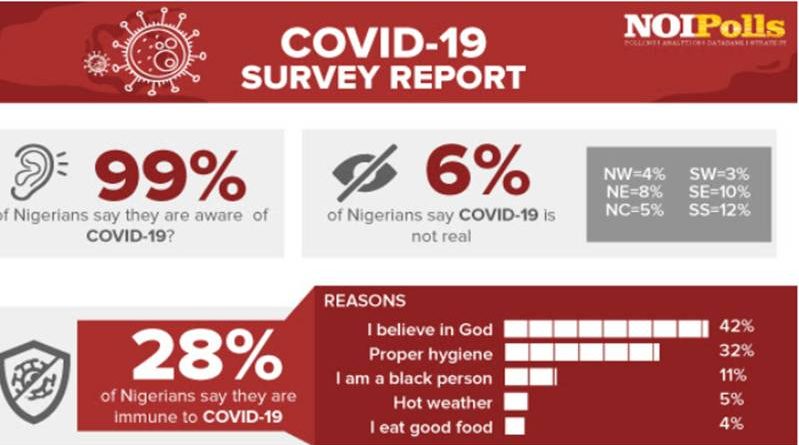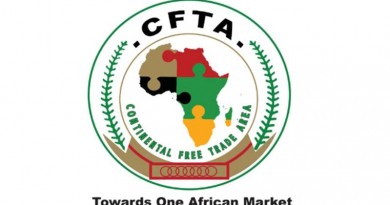COVID-19 Lock down; 72% of Nigerians fear looming Hunger
Since the first case of corona virus disease (COVID-19) was confirmed in Wuhan, China late last year, the virus has exploded into a global pandemic as it has spread to 210 countries and territories. According to data compiled by Johns Hopkins University on 13th April 2020, the disease has killed about 115,244 people and infected 1,866,460 people worldwide[1]. The pandemic has sent shockwaves throughout the global economy and billions of people into lockdown as health services struggle to manages case and contain further spread of the virus.
Nigeria recorded its first case of COVID-19 on the 25th of February 2020 however, as of April 12th, 2020, Nigeria has recorded 323 confirmed cases of COVID-19 across 19 states with 85 recovered and 10 deaths[2]. Against this background, NOIPolls conducted its second public opinion poll on COVID-19 to gauge the perception of Nigerians regarding awareness, lockdown order as well as ascertain the level of concern in the country. The first poll was conducted in the week commencing March 3rd, 2020 when Nigeria had only 2 confirmed cases of COVID-19 while this poll was conducted in the week of April 1st, 2020 when Nigeria had 174 confirmed cases.
The poll result revealed that almost all adult Nigerians (99 percent) are aware of the outbreak of corona virus disease in the country. Trend analysis shows a significant 15 percent increase in the proportion of Nigerians who are aware of the outbreak when current results are compared with figures obtained in March. This is not surprising given that President Buhari, had on the 29th of March 2020, made a national broadcast on the country’s steps to contain the virus which included a lockdown of 3 states (FCT, Lagos and Ogun) for 14 days and some other states have independently issued lockdowns and restricted movements. Also, the Nigeria Centre for Disease Control (NCDC) regularly sends text messages to alert the citizens on the need to stay safe by adopting safety measures provided by health advisories.
Similarly, it is outrageous to note that the poll revealed that 28 percent of adult Nigerians maintained that they are immune to the virus. Further probing of respondents who held this belief established that 42 percent of them held this belief mainly because they believe in God, while 32 percent believed they were immune because they observe proper hygiene which prevents them from contracting the virus amongst other reasons.

87 percent of Nigerians divulged that they are concerned that they may contract the virus. This signifies a substantial 24 percent increase in the proportion of adult Nigerians who are concerned that they might contract the virus when current results are compared to the figures obtained in early March 2020. In addition, out of the 13 percent who claimed that they are not concerned, 41 percent of them disclosed that they are not concerned because they have trust in God to protect them from the virus, while 39 percent said that they are not concerned because they have been observing preventive measures amongst other reasons.
With regards to perception on the lockdown orders, 77 percent of Nigerians stated that the decision of the Federal Government is appropriate. Most respondents think it is appropriate because they believe it is the best way to control the spread of the virus in the country. However, 18 percent consider the lockdown to be too extreme. While 65 percent of the respondents opined that the lockdown should be extended to other states, 35 percent did not think it should be extended to other states. Majority of the respondents in the South West (76 percent) are of the opinion that it should be extended to other states and this is understandable as many of the confirmed cases in Nigeria were in Lagos state.
With regards to concerns with the lockdown, 72 percent of respondents specified that they have concerns about the lockdown. These concerns included lack of food for the poor (40 percent), that people will die of hunger (21 percent), of economic hardship (13 percent) and the survival of those whose livelihood depends on daily hustling (9 percent) amongst other concerns mentioned.
Further findings showed that Nigerians rated the Nigeria Center for Disease Control (NCDC) 6.97 out of a score of 10 in providing information or updates on COVID-19 and 6.36 in providing testing to those that need to be tested in the country. Similarly, the Federal Government was rated slightly above average (5.47 out of 10) in providing directives on how it plans to control the spread of the virus but was rated poorly in providing palliative measures to ensure that Nigerians follow its directives. It is therefore important for government and well meaningful Nigerians to assist more citizens, especially the poor and those whose livelihood depends on daily income as mentioned in this survey, with more palliatives. This will ensure that Nigerians follow the stay at home directive and help control the spread of the virus in the country. These are some of the key findings from the COVID-19 poll conducted in the week commencing April 1st, 2020.
Survey Background
The COVID-19 pandemic is a major global health crisis and the greatest challenge faced since World War II. The virus has spread to every continent with cases rising daily globally. Nations are battling to slow the spread of the virus by testing and treating patients, carrying out contact tracing, limiting travels and movement, quarantining citizens, and cancelling large gatherings such as sporting events, concerts, and schools. The pandemic moves like a wave, one that may crash on any country that is not able to contain the spread as it has the potential to create devastating social, economic and political crises that will leave deep scars.
As of April 13th, 2020, the rate of infection globally has crossed the 1 million mark. According to data from Johns Hopkins University, there are 1,866,460 people infected across the world with 115,244 death and remarkably, 433,915 recoveries[3]. Currently, the USA is the country with the highest number of confirmed cases which stand at 560,433[4].
In Africa, 52 out of 54 countries have confirmed cases of COVID-19. The infection rate is about 15,209 confirmed cases, 794 deaths and 2,961 recoveries[5]. In Nigeria as of 12th April 2020, a total of 323 confirmed cases has been recorded across 19 states with 10 deaths and 85 recoveries[6]. Lagos states remains highest with 176 confirmed cases while Abuja has 56 confirmed cases[7]. Against this background, NOIPolls conducted its second public opinion poll on COVID-19 to gauge the perception of Nigerians regarding awareness, lockdown order as well as ascertain the level of concern in the country.
Survey Findings
The first question assessed awareness of Nigerians on the outbreak of COVID-19 and the poll revealed that almost all adult Nigerians (99 percent) are aware of the outbreak of the virus disease. However, 1 percent of the respondents claimed not to be aware of this global pandemic. During the course of this survey, resposendents who claimed not to be aware of COVID-19 are Nigerians who live in villages and they were mostly local subsistence farmers.
Trend analysis shows a significant 15 percent increase in awareness when current results are compared to figures obtained in early March 2020 when Nigeria had only 2 confirmed case of the virus disease.

With regards to perceptions on being immune to COVID-19, it is shocking to know that 28 percent of adult Nigerians claimed that they are immune to the coronavirus disease given the numbers of confirmed cases in the country has risen to over 323 and that there is no scientific evidence to back this belief. The South-East (45 percent) and South-South (39 percent) zones had more respondents who believe they are immune to the virus.
Trend analysis of result reveals a 2 percent increase in the number of Nigerians who believe that they are immune to the virus when current figures are compared with findings obtained in early March, 2020 when Nigeria had only 2 confirmed case of the virus disease.


Out of the 28 percent who indicated that they are immune to COVID-19, 42 percent disclosed that they are immune because they believe in God. However, 32 percent specified that they believe they are immune because they observe proper hygiene which can prevent infection from the virus. 11 percent mentioned that they are immune to COVID-19 mainly because a are Africans amongst other reasons cited.

Consequently, when asked: how concerned are you that you might get the Corona Virus Disease? The poll result revealed that majority of adult Nigerians (87 percent) are concerned that they might get infected by the virus. This view cuts across all demographics (gender, geo-political zones and age-group). On the contrary, 13 percent of the respondents claimed that they are not concenred about contracting the virus disease.
Trend analysis indicates an increase in the level of concern amongst Nigerians. Current findings show a substantial 24 percent increase in the number of who are concerned that they might contract the virus when compared to the result obtained in early March 2020 when Nigeria had only 2 confirmed case of the virus disease.


Out of the 13 percent who claimed that they are not concerned of getting the virus, 41 percent cited that they are not concerned of contracting COVID-19 mainly because they trust God to protect them from the virus. This is followed by 35 percent who stated that they have been taking preventive measures hence they are not concerned about contracting the virus amongst other reasons mentioned.

With regards to perception on the lockdown order in FCT, Lagos and Ogun for 14 days due to COVID-19, majority of adult Nigerians (77 percent) stated that the decision of the Federal Government is appropriate. The south-West zone (85 percent) had more Nigerians who consider the action of the Federal Government as appropriate. During this survey, most Nigerians think it is appropriate because they believe it is the best way to control the spread of the virus disease in the country.
In addition, 18 percent consider the lockdown to be too extreme and the South-East zone had more respondents who made this assertion. Nigerians in this category informed our analysts during this survey that it is too extreme because some Nigerians who depend on daily income may likely suffer from starvation while others are of the view that the lockdown was too sudden.

When respondents were asked: Do you have any concern about the lockdown order in some states? The result indicated that 72 percent of Nigerians acknowledged that they have one concern or the other about the lockdown in some states. The North-East zone (87 percent) had more respondents who stated that they have concern about the lockdown order in some states. However, 28 percent of Nigerians said that they do not have any concern about the lockdown in some states. The South-West zone (40 percent) had more respondents who stated that they do not have any concern about the lockdown.
Nigerians who indicated that they have concern about the lockdown in some states were further probed and the result showed that lack of food for the poor was cited as their main concern about the lockdown as indicated by 40 percent of Nigerians. This followed by 21 percent who mentioned that they were concerned that people will die of hunger. Also, 13 percent said that they are concerned about the economic hardship during the lockdown.



In conclusion, the survey has shown that the level of awareness of COVID-19 is very high (99 percent) and this cuts across all demographic variables. This increase represents a substantial 15 percent increase in the proportion of Nigerians who are aware of the outbreak of COVID-19 when current results are compared with findings obtained in early March 2020. This could be the impact created by the President Buhari’s national broadcast on COVID-19 as well as other awareness messages created by NCDC, other government agencies, organizations, and individuals.
It is appalling to know at this stage that some Nigerians (6 percent) do not believe that the outbreak of the virus is real in Nigeria. Similarly, it is worrisome to know that 28 percent of Nigerians think they are immune to the virus though it is comforting to know that 35 percent of this group believe they are immune because they are observing preventive measures. Of concern include the 42 percent that believe they are immune because of their belief in God. There is an urgent need to address this belief of immunity to the COVID-19 because of belief in God and to completely erase the illusions about being immune to COVID-19.
There is need for health advisories and other stakeholders to keep a pulse on the level of concern and panic among citizens as 87 percent of Nigerians disclosed that they are concerned they might contract the virus. This increase signifies a 24 percent increase when current results are compared with figures obtained in March 2020. It is encouraging to know that a substantial proportion of Nigerians believe that lockdown will help in controlling the spread of the disease. However, it is critical to address the concerns citizens have about the lockdown which include lack of food for the poor (40 percent), that people will die of hunger (21 percent), of economic hardship (13 percent) and the survival of those whose livelihood depends on daily hustling (9 percent) amongst other concerns mentioned. Government and well meaningful Nigerians should assist more citizens, especially the poor and those whose livelihood depends on daily income as pointed out in this survey, with more palliatives. This will not only ensure that Nigerians follow the stay at home directive but will help control the spread of the virus in the country.
We therefore advise government at all levels, organizations, and health workers to use this survey as reference for effective planning and implementation of activities to effectively prevent Nigerians from COVID-19. It will provide opportunity to prioritize actions and messaging to build and sustain trust between government and citizens, as well as fully take measures to further restrict the spread of COVID-19.
Finally, social distancing, good hygienic practices like hand washing remain the most effective ways in protecting oneself from the virus. Detection, containment, and contact tracing should be a high priority of the approach adopted and must be backed with high commitment by the different health agencies of the government and as well as the general public.
Survey Methods
The poll was conducted in the week commencing April 1st, 2020. It involved telephone interviews of a proportionate nationwide sample of 1,000 randomly selected phone-owning Nigerians aged 18 years and above, representing the six geo-political regions and 36 states and the FCT of the country. Interviews were conducted in 5 languages – Igbo, Hausa, Yoruba, Pidgin English, and English. With this sample size and selection, we are 95% confident that the results obtained are statistically precise within a margin of error of plus or minus 4.65%.
We recognize that the exclusive use of telephone polling has its limitation of excluding non-phone-owning Nigerians. Nonetheless, with the country’s tele density put over 100 percent by the Nigerian Communications Commission (NCC), we consider our telephone polling approach appropriate. Also, given the rigorous scientific process of randomization and stratification applied, we are confident of the validity of our methodology and approach. NOIPolls Limited, No1 for country specific polling services in West Africa. We conduct periodic opinion polls and studies on various socio-economic and political issues in Nigeria. More information is available at www.noi-polls.com.
This press release has been produced by NOIPolls Limited to provide information on all issues which form the subject matter of the document. Kindly note that while we are willing to share results from our polls with the general public, we only request that NOIPolls be acknowledged as author whenever and wherever our poll results are used, cited, or published.
NOIPolls hereby certifies that all the views expressed in this document accurately reflect its views of respondents surveyed for the poll, and background information is based on information from various sources that it believes are reliable; however, no representation is made that it is accurate or complete. Whilst reasonable care has been taken in preparing this document, no responsibility or liability is accepted for errors or fact or for any views expressed herein by NOIPolls for actions taken as a result of information provided in this report. Any ratings, forecasts, estimates, opinions, or views herein constitute a judgment as at the date of this document. If the date of this document is not current, the views and content may not reflect NOIPolls’ current findings and/or thinking




